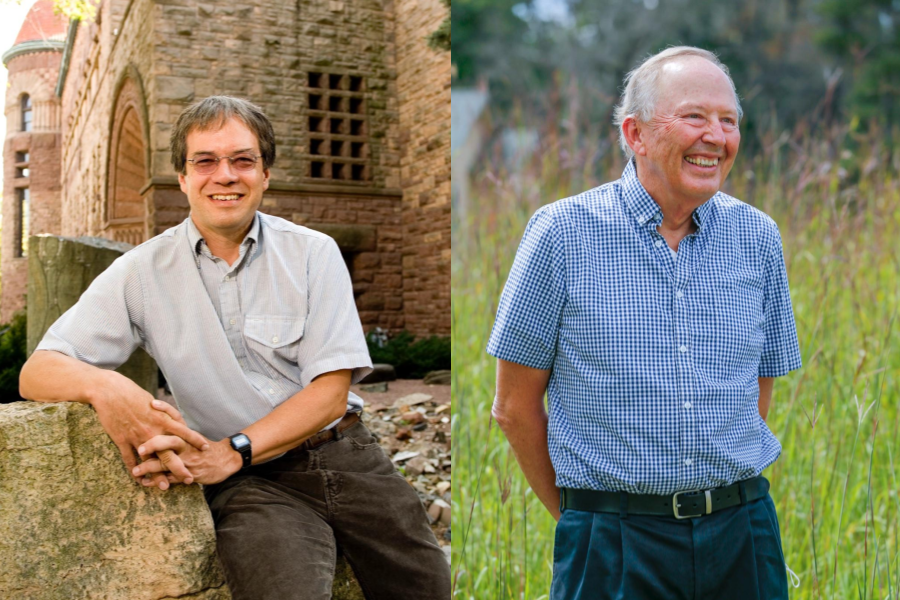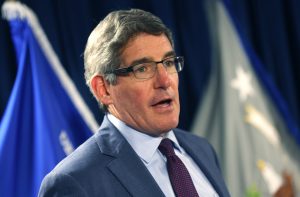
Two University of Minnesota professors each awarded National Medal of Science
Two University of Minnesota professors each received the National Medal of Science at a White House ceremony last week for their work in geochemistry and ecology.
R. Lawrence Edwards and David Tilman were recognized with the award among 14 laureates on Friday. Nominees are evaluated by a committee of scientists and engineers appointed by the president, according to the U.S. National Science Foundation.
“We are incredibly proud to celebrate and honor Professors Edwards and Tilman for their tremendous achievements in pushing the boundaries of science and innovation,” said University of Minnesota President Rebecca Cunningham, in a release. “Their unwavering commitment to excellence has enhanced the collective understanding of our planet. The new knowledge they have generated and the discoveries they have uncovered will play a key role in shaping a brighter future for generations to come.”
Managed by the National Science Foundation, the presidential award is given to those who have made “outstanding contributions to knowledge in the physical, biological, mathematical, engineering, or social and behavioral sciences,” according to the release. It is considered the country’s highest recognition for scientists and engineers.
Edwards, a regents and Distinguished McKnight University professor in the College of Science and Engineering, is an isotope geochemist who has helped develop modern uranium-thorium dating methods which have contributed to understanding of the planet’s climate history and ocean chemistry, according to the release.
Using data from cave deposits, ocean sediments and ice cores, Edwards also has established patterns on climate changes and his work has helped explain the causes of abrupt climate change and rapid melting of ice sheets at the end of glacial cycles. Most of his work is done using a mass spectrometer, the modern version of which was developed by St. Paul-native Alfred O. C. Nier.
“So improving the timeline of climate history is really when my contribution has been, and it’s been not only with the improvement in uranium thorium dating, but we’ve used that improvement in uranium thorium dating to improve carbon dating as well,” Edwards said.
Dating improvements have allowed for a more precise timeline of climate history, Edwards said. The recognition is the honor of a lifetime, he said.
“And I never thought I would be honored in this way. My dad used to say, put one foot in front of the other. And that’s sort of what I’ve done. It’s just keep on going along and following different threads. And then, sooner or later, things start clicking, and this happens, and that happens, and then things kind of work out. But we ended up putting together these incredible climate records and then going from there,” Edwards said.
Tilman, a regents professor of ecology, evolution and behavior in the College of Biological Sciences, is the most highly cited ecologist in the world and known for his combined use of mathematics and biology to understand plant species interactions. Tilman formerly served as director of Cedar Creek Ecosystem Science Reserve where he explored how human impacts on nature then affect people. His research has informed global environmental preservation strategies, such as cleansing air and water.
The number of species in a system and its diversity is one of the most important variables in determining how an ecosystem operates, Tilman said. Loss of species is akin to losing a profession and its skills that help a society operate, Tilman said.
“We’ve been able to (uncover) these general principles that seem to apply very broadly from one place around the earth to another place and another. And it is that broad intellectual framework which has helped solve problems in ecosystems around the world,” Tilman said.
One of the most exciting and interesting parts of receiving the National Medal of Science was meeting other recipients, Tilman said.
“We often hear scary, seemingly scary news, about major environmental problems. I will say, we do have major problems, but there’s been so much work done, not just by me, but by scholars around the world, we now know solutions to these problems. We know solutions that can actually solve these problems at the same time they give us, as citizens of the world, of people living in Minnesota, wherever we might live, actually a better life than they had before,” Tilman said.
Edwards and Tilman are members of the American Academy of Arts and Sciences and the National Academy of Science. Late University of Minnesota faculty members Norman Borlaug and Leonid Hurwicz won the National Medal of Science in 2004 for contributions in plant pathology by Borlaug and in 1990 for economics to Hurwicz.
Related Articles
U of M students interrupt Board of Regents meeting in protest for divestment
Gophers football will play at Wrigley Field in 2025
Timothée Chalamet leaves University of Minnesota buzzing after surprise visit
Twin Cities colleges, universities pursue renovations, new buildings despite enrollment challenges
University of Minnesota students studying Dakota language reflect on program’s future


